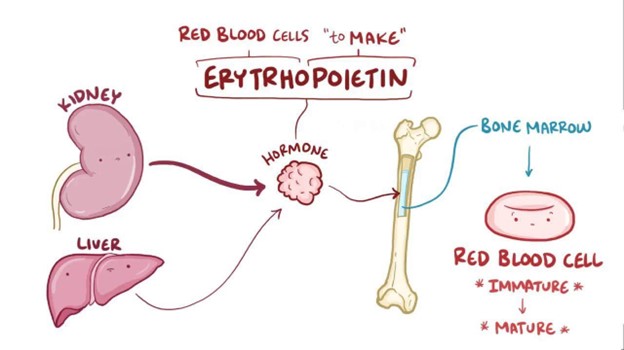A nurse is collecting data from a client who has diabetes mellitus. The client is confused, flushed, and has an acetone odor on his breath. The nurse should anticipate a prescription for which of the following types of insulin to treat the client?
Lantus
NPH
Regular
Lispro
The Correct Answer is C
Choice A Reason: Lantus is not a type of insulin that can treat this client, as it is a long-acting insulin that has no peak effect and lasts for 24 hours.
Choice B Reason: NPH is not a type of insulin that can treat this client, as it is an intermediate-acting insulin that peaks in 6 to 8 hours and lasts for 12 to 18 hours.
Choice C Reason: Regular is a type of insulin that can treat this client, as it is a short-acting insulin that peaks in 2 to 4 hours and lasts for 6 to 8 hours. It can be used to correct high blood glucose levels and treat diabetic ketoacidosis (DKA), which is indicated by confusion, flushing, and acetone breath.
Choice D Reason: Lispro is not a type of insulin that can treat this client, as it is a rapid-acting insulin that peaks in 30 minutes and lasts for 3 to 5 hours. It can be used to cover meals or snacks but not to treat DKA.
Nursing Test Bank
Naxlex Comprehensive Predictor Exams
Related Questions
Correct Answer is D
Explanation
Choice A Reason: Loss of erythropoietin will not result in diminished immunologic function, but it may affect the production of some white blood cells and antibodies.
Choice B Reason: Loss of erythropoietin will not result in hypertension, but it may cause hypotension due to reduced blood volume and viscosity.
Choice C Reason: Loss of erythropoietin will not result in elevated lipid levels in the bloodstream, but it may be associated with dyslipidemia due to other factors such as malnutrition, inflammation, or medication use.
Choice D Reason: Loss of erythropoietin will result in anemia, as erythropoietin is a hormone that stimulates the bone marrow to produce red blood cells.

Correct Answer is D
Explanation
Choice A Reason: N0 does not indicate presence of regional lymph node involvement, but absence of it. N1 to N3 indicate increasing degrees of regional lymph node involvement.
Choice B Reason: TIS does not indicate that a tumor has been resolved, but that it is in situ, meaning that it is confined to the original site and has not invaded deeper tissues.
Choice C Reason: T4 does not indicate a tumor at its smallest size, but at its largest size. T1 to T4 indicate increasing sizes or extents of the primary tumor.
Choice D Reason: M1 indicates tumor metastasis to a single site, meaning that the cancer has spread to another organ or distant lymph node. M0 indicates no distant metastasis.
Whether you are a student looking to ace your exams or a practicing nurse seeking to enhance your expertise , our nursing education contents will empower you with the confidence and competence to make a difference in the lives of patients and become a respected leader in the healthcare field.
Visit Naxlex, invest in your future and unlock endless possibilities with our unparalleled nursing education contents today
Report Wrong Answer on the Current Question
Do you disagree with the answer? If yes, what is your expected answer? Explain.
Kindly be descriptive with the issue you are facing.
